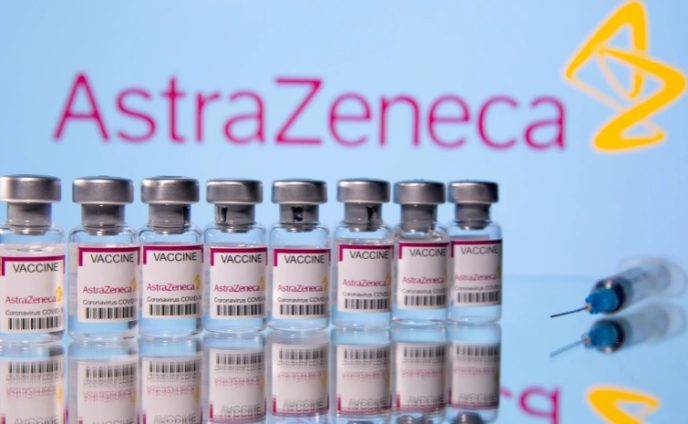A new laboratory study by the University of Oxford has indicated that AstraZeneca’s Covid-19 Vaccine boosts levels of antibodies against the Omicron SARS-CoV-2 variant (B.1.1.529) significantly.
The University came to this conclusion following a study that analysed blood samples taken from individuals infected with Covid-19; those who had been vaccinated with a two-dose schedule and a third dose booster; and those who had reported previous infection from other Covid-19 variants of concern.
The study included samples from 41 individuals who had received three doses of Covid-19 AstraZeneca Vaccine.
It was observed that neutralisation titres for Omicron were boosted following a third dose with Covid-19 AstraZeneca Vaccine compared to titres after a second dose.
The levels seen after the third dose booster were higher than the neutralising antibodies found in individuals who had been previously infected with and recovered naturally from Covid-19 (Alpha, Beta, Delta variants and original strain).
AstraZeneca in a press statement noted that Sera obtained from individuals one month after receiving the third dose booster vaccination neutralised the Omicron variant to levels that were broadly similar to those observed one month after the second dose against the Delta variant.
"Two doses of Covid-19 Vaccine AstraZeneca have been associated with protection against the Delta variant in real world studies," the statement added.
The findings of the study can be accessed online on the bioRxiv pre print server.
Regius Professor of Medicine at the University of Oxford, UK, Professor Sir John Bell, and one of the study investigators, said: “It is very encouraging to see that current vaccines have the potential to protect against Omicron following a third dose booster. These results support the use of third dose boosters as part of national vaccine strategies, especially to limit the spread of variants of concern, including Omicron.”
Sir Mene Pangalos, who is the Executive Vice President of BioPharmaceuticals R&D at AstraZeneca noted the vaccines play a vital role in vaccination programmes globally.
“Covid-19 Vaccine AstraZeneca plays an important role in vaccination programmes around the world and these data give us confidence that the vaccine should be given as a third dose booster. It is also important to look beyond antibodies to better understand how vaccines offer protection against Omicron. As we better understand Omicron, we believe we will find that T-cell response provides durable protection against severe disease and hospitalisations.”
Meanwhile, data from another laboratory study supports Covid-19 Vaccine AstraZeneca’s effect against Omicron, with individuals vaccinated with two doses of AstraZeneca retaining neutralising activity against Omicron, although a decrease was seen compared to the original strain.
In other studies, Covid-19 Vaccine AstraZeneca has been shown to generate a diverse and durable T-cell response to multiple variants resulting in a broader response than antibodies alone, which could contribute to protection against the virus.
AstraZeneca is collecting real world evidence evaluating the effectiveness against the Omicron variant with academic groups in the southern African region.
AstraZeneca is also analysing blood samples from participants in the Company’s Phase II/III trial to evaluate neutralising activity when given as a third dose booster against Omicron for both Covid-19 Vaccine AstraZeneca and its investigational next generation Covid-19 vaccine, AZD2816.
Data from these studies are expected soon. Currently, available data against variants of concern, excluding Omicron, support the use of a third booster with Covid-19 Vaccine AstraZeneca as part of a homologous or heterologous schedule.
AstraZeneca vaccine
Covid-19 Vaccine AstraZeneca was co-invented by the University of Oxford and its spin-out company, Vaccitech. It uses a replication-deficient chimpanzee viral vector based on a weakened version of a common cold virus (adenovirus) that causes infections in chimpanzees and contains the genetic material of the SARS-CoV-2 virus spike protein.
After vaccination, the surface spike protein is produced, priming the immune system to attack the SARS-CoV-2 virus if it later infects the body.
The vaccine has been granted a conditional marketing authorisation or emergency use in more than 90 countries. It also has Emergency Use Listing from the World Health Organization, which accelerates the pathway to access in up to 142 countries through the COVAX Facility.
Under a sub-license agreement with AstraZeneca, the vaccine is manufactured and supplied by the Serum Institute of India under the name COVISHIELD.
Latest Stories
-
Decomposing body of 71-year-old retired teacher found in well
6 minutes -
I will marshal every effort to answer my removal process — Justice Torkornoo
14 minutes -
Ghana Anti-Corruption Coalition organises workshop on asset recovery, management
16 minutes -
Miner jailed 23 years for defiling three-year-old girl
20 minutes -
Ghana to host 2nd World Shea Expo in Tamale – Otokunor
22 minutes -
Koo Ofori’s alleged fraud case adjourned to August 13
58 minutes -
School of Hygiene in Ho demands release of its lecture halls occupied by UHAS
1 hour -
Nike says Trump tariffs could raise its costs by $1bn
1 hour -
‘Brilliant’ and ‘a real character’ – Liverpool sign Kerkez for £40m
2 hours -
Arsenal in talks to sign Valencia defender Mosquera
2 hours -
I went to Saudi for trophies, not money – Mendy
2 hours -
Man City put 5 past Juventus in Club World Cup
2 hours -
Ronaldo signs new deal with Saudi club Al-Nassr
2 hours -
Migrant crackdown risks choking off critical supply of US workers
4 hours -
Brad Pitt’s Los Angeles home ‘ransacked’, police say
4 hours

